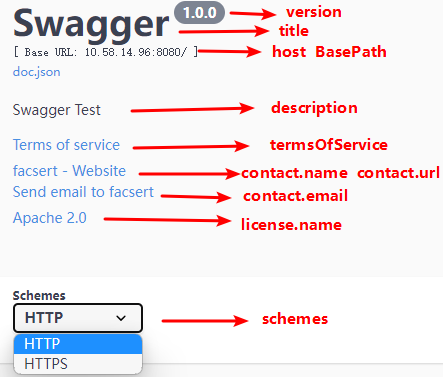Go Swagger
Table of Contents
安装
下载 swagger 关联的库
$ go get -u github.com/swaggo/swag/cmd/swag # swag 命令行工具
$ go get -u github.com/swaggo/gin-swagger
$ go get -u github.com/swaggo/files
$ go install github.com/swaggo/swag/cmd/swag # 编译生产可执行文件放入$GOPATH/bin
$ swag -v
> swag version v1.8.12
添加注释并拉起服务后,浏览器访问 http://<host>:<port>/swagger/index.html
通用注解
go swagger 通过注释绑定接口设置和显示内容
Github swag
package main
import (
"net/http"
"github.com/gin-gonic/gin" // 引入 gin
"github.com/swaggo/gin-swagger" // gin-swagger middleware
"github.com/swaggo/files" // swagger embed files
_ "swag/docs" // <project>/docs swag 为项目名
)
// @title Swagger Example API
// @version 1.0
// @description This is a sample server celler server.
// @termsOfService http://swagger.io/terms/
// @contact.name API Support
// @contact.url http://www.swagger.io/support
// @contact.email support@swagger.io
// @license.name Apache 2.0
// @license.url http://www.apache.org/licenses/LICENSE-2.0.html
// @host localhost:8080
// @BasePath /
// @schemes http https
// @description Swagger Test
// @securityDefinitions.basic BasicAuth
// @contact.name facsert
// @contact.url https://facsert.github.io/
// @contact.email facsert@outlook.com
// @externalDocs.description OpenAPI
// @externalDocs.url https://swagger.io/resources/open-api/
func main() {
engine := gin.Default()
engine.GET("/swagger/*any", ginSwagger.WrapHandler(swaggerFiles.Handler))
engine.Run(":8080")
}

| 字段 | 说明 | 示例 |
|---|---|---|
@title | (必填)大标题 | Swagger |
@version | (必填)版本 | 1.0.0 |
@description | 描述 | Swagger Test |
@host | 运行服务主机 IP 地址 | 10.58.14.96:8080 |
@BasePath | API 基本路径(会添加在所有 API 路由前) | / |
@schemes | 请求的传输协议 | http https |
@contact.name | 联系人信息 | facsert |
@contact.url | 联系人信息网址 | https://facsert.github.io/ |
@contact.email | 联系人邮件 | facsert@outlook.com |
@termsOfService | API 服务条款 | http://swagger.io/terms/ |
@license.name | (必填)API 许可证名称 | Apache 2.0 |
@license.url | API 许可证网址 | http://www.apache.org/licenses/LICENSE-2.0.html |
部分字段如 @title @version @license.name 是必填字段,字段首字母不区分大小写
其余字段可填,可不填写
API 注解
// @tags Router
// @id root
// @summary "root page"
// @Produce json
// @Success 200 {object} string "response with root page"
// @Failure 400 {object} string "response with root page fail"
// @Router / [get]
func webRoot(context *gin.Context) {
context.String(http.StatusOK, "this is root page")
}
| 字段 | 说明 | 示例 |
|---|---|---|
@tags | 一组 API 的组名 | User |
@id | API 唯一标识 | root page |
@summary | API 简短描述 | show info |
@Router | (必填)路由和请求方法 | /root/user [get] |
@Param | 接口参数 | name path string true "username" |
@Accept | 请求体的 MIME 类型数据 | json |
@Produce | 响应体的 MIME 类型数据 | json |
@Success | 响应成功内容 | 200 {object} string "response success" |
@Failure | 响应失败内容 | 400 {object} string "response fail" |
@Response | 响应失败内容 | 500 {object} string "response fail" |
部分字段如 @Router 是必填字段,缺失则不显示,字段首字母不区分大小写
其余字段根据不同接口影响功能测试
MIME 类型
MIME 类型即请求体和响应体的类型
// @Accept application/json 请求体是 json 类型数据
// @Accept application/xml 请求体是 XML 格式数据
// @Accept application/x-www-form-urlencoded 请求体是表单类型
// @Produce text/plain 响应纯文本数据
// @Produce text/html 响应 HTML 数据
// @Produce application/octet-stream 响应二进制流数据, 返回客户端需要下载的文件
响应
@Response {return Code} {param type} {date type} commit
// @Success 200 {array} model.Account
// @Header 200 {string} Token "qwerty"
// @Failure 400,404 {object} httputil.HTTPError
// @Failure default {object} httputil.DefaultError
参数
@Parma name locate type need description attribute API 参数信息和约束
- name: 参数名
- locate: 参数位置(path, query, header, body 或 formData)
- type: 参数的数据类型(可以使用自定义类型)
- need: 是否必须
- description: 参数的描述
- attribute: 属性(选填), 根据类型可以限定最大最小值, 长度, 格式等
// @Param userId path int true "UserID" minimum(0) minimum(9)
// @Param username query string true "Username" minLength(0) maxLength(9)
// @Param levle path int true "Levle" enums(1, 2, 3)
// @Param user body User true "User"
// @Param file formData file true "File upload"
路由
@Router path [httpMethod]
静态路由: 固定路由,不会发生改变
func main() {
...
engine.GET("/index/static", static)
...
}
// @Tags User
// @summary static router
// @Router /index/static [get]
func static(c *gin.Context) {
c.String(http.StatusOK, "static page")
}
动态路由: 路由中存在参数
func main() {
...
engine.GET("/index/:name/:attribute", detail)
...
}
// @Tags User
// @summary user api
// @Param name path string true "name"
// @Param attribute path string true "attribute name"
// @Router /index/{name}/{attribute} [get]
func detail(c *gin.Context) {
name := c.Param("name")
attr := c.Param("attribute")
c.String(http.StatusOK, "name:%s attribute:%s", name, attr)
}